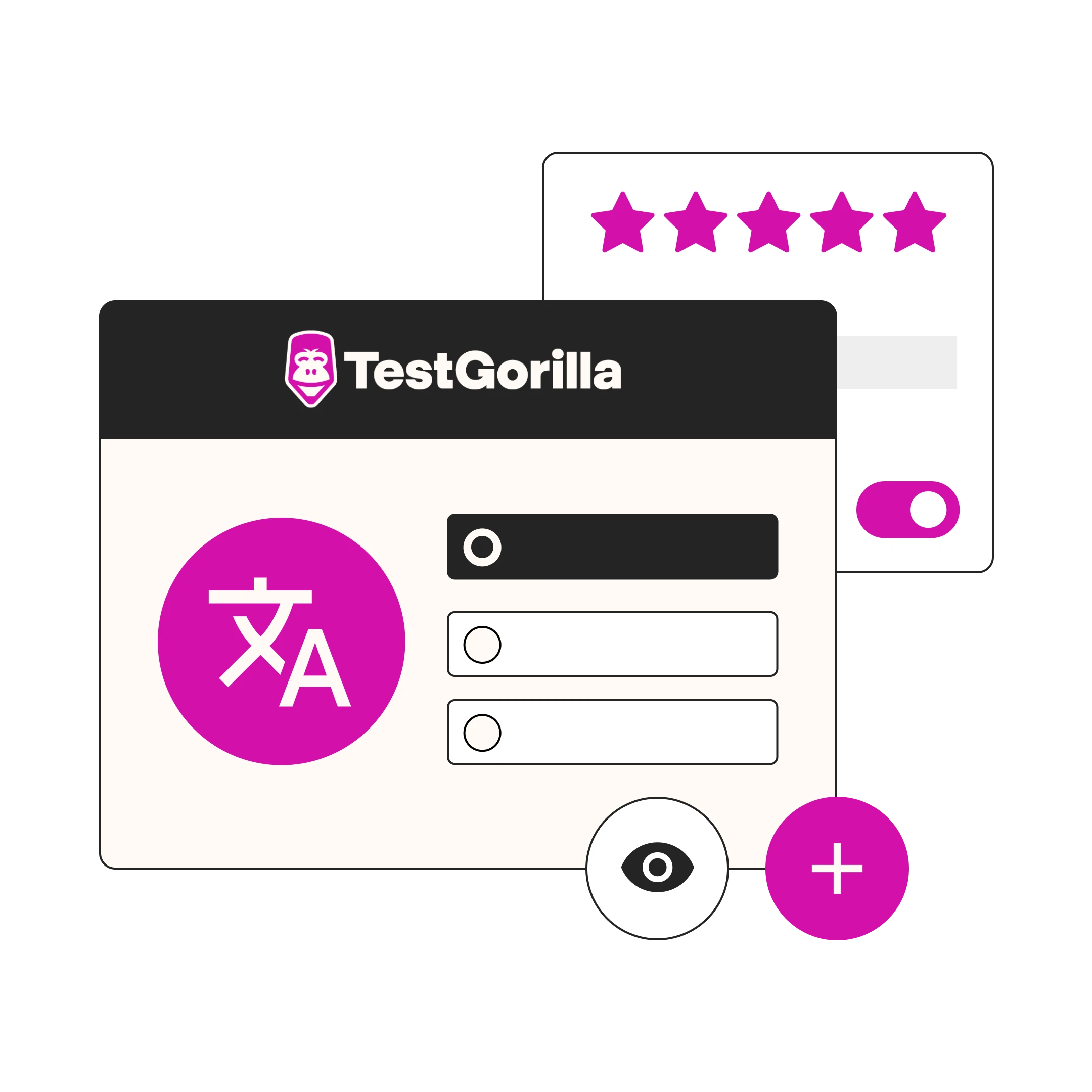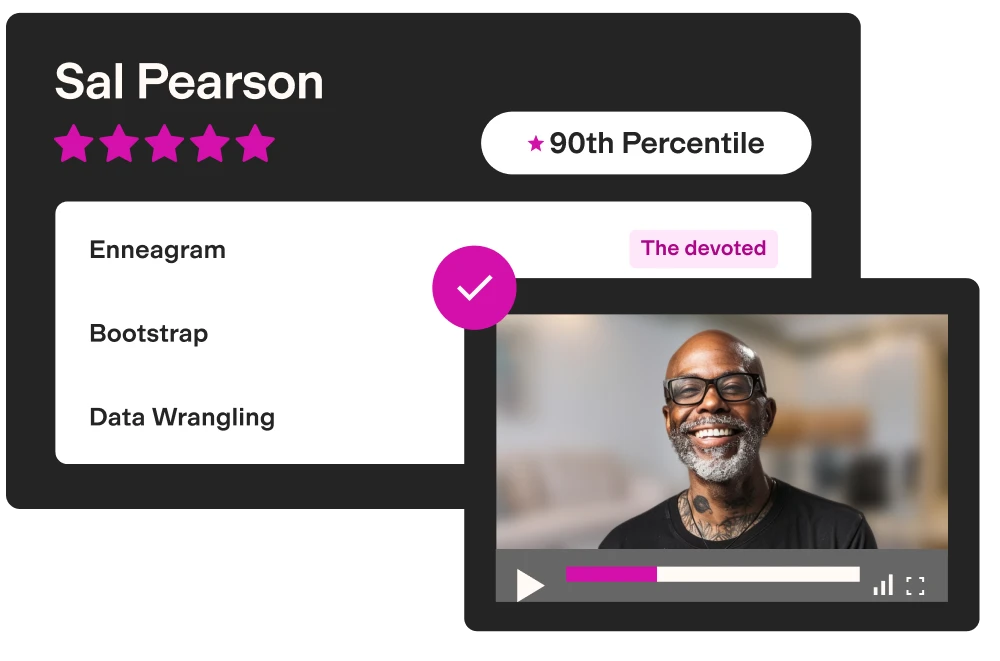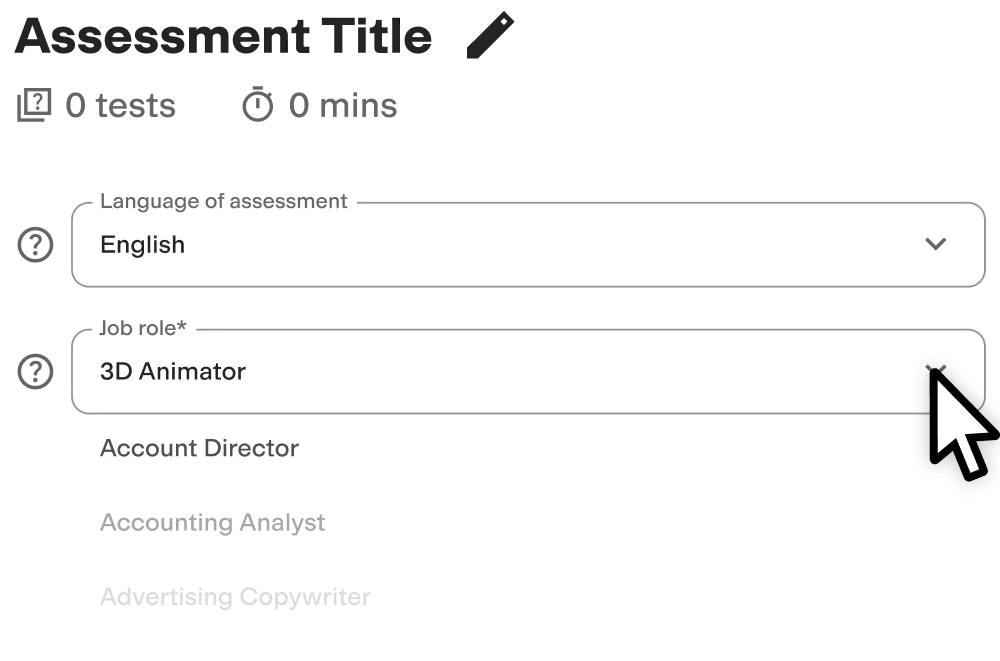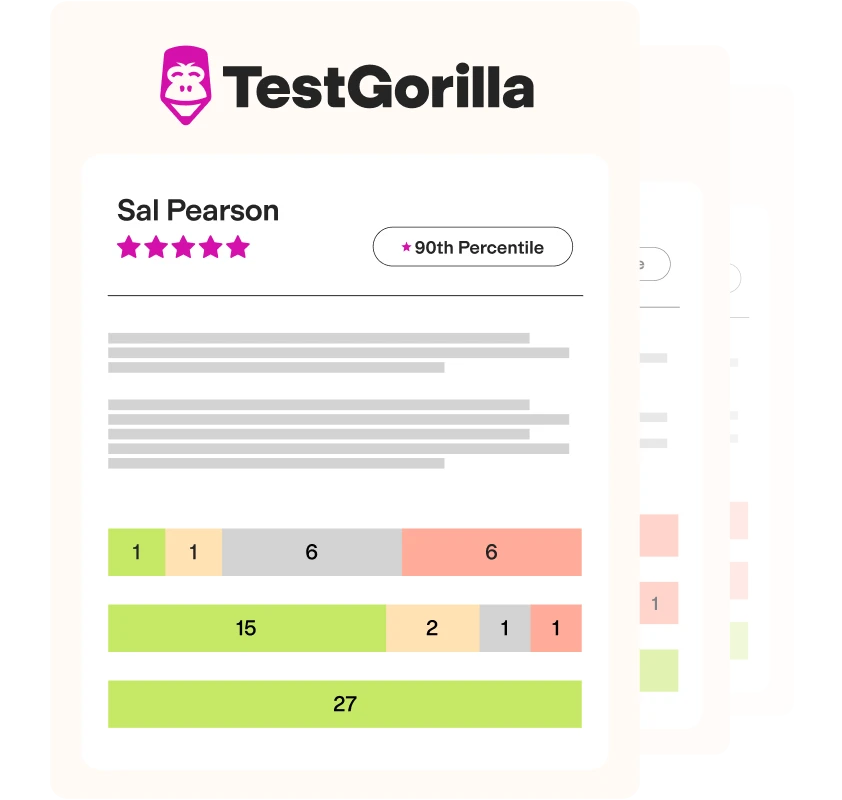English proficiency test C1: Pre-employment screening assessment to hire the best candidates
Summary of the English (proficient/C1) test
The English (proficient/C1) test evaluates a candidate’s knowledge of the English language at the C1 level of the CEFR framework. This test will help you hire employees who can participate in demanding professional and social conversations in English.
Covered skills
Grammar & vocabulary
Forming complete sentences
Reading comprehension
Listening comprehension
Use the English (proficient/C1) test to hire
Editors, writers, content creators, customer success managers, and other employees that need to be proficient in English to perform well in their roles.
About the English (proficient/C1) test
Employees who are proficient in English will enrich your company’s internal and external communications by clearly and effectively discussing ideas, plans, and goals with customers and colleagues. They will also be able to write well-structured reports, presentations, and other material in English to help promote the company’s brand and ideas to others.
The English (proficient/C1) test evaluates a candidate’s ability to communicate at the C1 level of the Common European Framework of Reference (CEFR) for Languages. The test evaluates candidates in grammar and vocabulary, sentence composition, reading comprehension, and listening comprehension.
Employees who are proficient in English can express themselves fluently and spontaneously without much searching for expressions. They can understand demanding, longer texts and recognize implicit meaning in written and verbal communications. They use the language flexibly and effectively for social, academic, and professional purposes. They can produce detailed texts on complex subjects, showing controlled use of organizational patterns, connectors, and cohesive devices.
The test is made by a subject-matter expert
John G.
Trained linguist John Galindo (MA in Linguistics) has been teaching English as a second language (ESL) to adults for over six years and is currently an Instructor of English at a University in Osaka, Japan. With expertise in linguistic analysis and speech acoustics, John focuses his teaching on perfecting his students’ writing and pronunciation skills. John works as a freelance linguist, providing Executive Language Coaching, linguistic analysis, and language assessment materials to his clients.
Crafted with expert knowledge
TestGorilla’s tests are created by subject matter experts. We assess potential subject-matter experts based on their knowledge, ability, and reputation. Before being published, each test is peer-reviewed by another expert, then calibrated using hundreds of test takers with relevant experience in the subject. Our feedback mechanisms and unique algorithms allow our subject-matter experts to constantly improve their tests.
What our customers are saying
TestGorilla helps me to assess engineers rapidly. Creating assessments for different positions is easy due to pre-existing templates. You can create an assessment in less than 2 minutes. The interface is intuitive and it’s easy to visualize results per assessment.

VP of engineering, mid-market (51-1000 FTE)
Any tool can have functions—bells and whistles. Not every tool comes armed with staff passionate about making the user experience positive.
The TestGorilla team only offers useful insights to user challenges, they engage in conversation.
For instance, I recently asked a question about a Python test I intended to implement. Instead of receiving “oh, that test would work perfectly for your solution,” or, “at this time we’re thinking about implementing a solution that may or may not…” I received a direct and straightforward answer with additional thoughts to help shape the solution.
I hope that TestGorilla realizes the value proposition in their work is not only the platform but the type of support that’s provided.
For a bit of context—I am a diversity recruiter trying to create a platform that removes bias from the hiring process and encourages the discovery of new and unseen talent.

Chief Talent Connector, small business (50 or fewer FTE)
Use TestGorilla to hire the best faster, easier and bias-free
Our screening tests identify the best candidates and make your hiring decisions faster, easier, and bias-free.
Watch what TestGorilla can do for you
Create high-quality assessments, fast
Building assessments is a breeze with TestGorilla. Get started with these simple steps.
View a sample report
The English (proficient/C1) test will be included in a PDF report along with the other tests from your assessment. You can easily download and share this report with colleagues and candidates.
Assess candidate proficiency with an English C1 test
When hiring non-native English speakers for a role where they need to be fluent in the language, it’s important to test their proficiency level.
The English Proficient/C1 test will help you evaluate your applicants’ speaking, listening, writing, and reading skills in English. This test helps you ensure that the candidate has full operational proficiency in the language and corresponds to the C1 level of the CEFR framework (we will explain all about the CEFR framework shortly).
This test will help you evaluate your candidates and see how well they can discuss ideas, plans, and goals in English, regardless of whether they need to talk with clients, managers, peers, partners, or stakeholders.
The pre-employment assessment will also test your applicants’ capacity to write a well-structured report, create a compelling presentation, or write a memo with clarity. To pass the test, candidates will need to be proficient users of the language and satisfy the requirements of the C1 level.
The C1 test is one of the most difficult tests you can have when it comes to testing language proficiency; there’s only one level above it, C2, which corresponds to a native proficiency. You can use this test when hiring for one of the following roles:
• Content writers and copywriters
• Editors
• Consultants
• Managers (project managers, team leads, and more
• Customer success representatives
• Business development representatives
When you want to hire a candidate who is fluent in English, you will need to test their language skills and make sure they’re on par with the requirements of the role.
That’s when you should use a pre-employment test like the English Proficient/C1 test to evaluate your candidate in an objective and bias-free way.
What does this English C1 test measure?
TestGorilla’s English language C1 test evaluates your candidates’ skills in four different areas:
• Reading: Reading skills refer to how well candidates can understand and work with a complex text in written form. Since you’re looking to hire a person with a C1-level proficiency, they shouldn’t have problems interpreting even the most complicated and technical topics.
• Writing: Testing candidates’ writing skills is essential for most specialized jobs. Applicants should be able to write about complex topics with ease, and make no grammatical or syntax errors.
• Speaking: Speaking skills refer to how well candidates can communicate their ideas and thoughts to others verbally. With this test, you can assess candidates’ abilities to form complete sentences; you can further test their speaking skills during phone interviews. A candidate with a C1-level proficiency will be able to hold a conversation on any topic without difficulty.
• Listening: Candidates with a C1-level proficiency will be able to understand others nearly 100% of the time, regardless of the other person’s accent and the idioms and expressions they use. With this test, you’ll be able to assess your applicants’ listening comprehension.
What is the CEFR Framework?
CEFR, short for the Common European Framework of Reference for Languages, is an international framework used to describe language proficiency in six levels, from beginner (A1) to native-level proficiency (C2).
The CEFR scale’s six proficiency levels are
• A1 level (beginner): A person who has this level of language skills will know how to introduce themselves, understand a couple of phrases, and have very simple interactions with another person.
• A2 level (elementary): An applicant whose language skills are at an A2 level can speak about more diverse topics such as their family, community, job, and more. They’ll be able to receive and understand basic instructions and perform routine tasks.
• B1 level (intermediate): At this level, candidates can hold a simple conversation on topics such as employment, personal and professional plans, travels, and more. They make mistakes when speaking, but they can still have a conversation with both native and non-native speakers.
• B2 level (upper-intermediate): Candidates who have a B2 level of fluency will be able to talk about a variety of topics with native speakers and write detailed texts with few mistakes.
• C1 level (advanced or operational proficiency): Candidates who have a C1 level of proficiency can read, write, and speak on almost any topic with ease, no matter how complex, difficult, or technical it is.
• C2 level (full proficiency): This is the last level on the CEFR scale and describes native proficiency. At this level, users have full mastery of the language and can navigate any situation without making any mistakes.
How can the English C1 test help recruiters make the right hiring decision?
If you need to hire someone who’s a confident English speaker and is able to deal with complicated situations and understand and produce texts on a variety of topics, you need to use a C1 test. Most office jobs require this level of proficiency. If you give candidates a B1 or an English B2 test, for example, you won’t be able to know if they have all the necessary language skills for the job.
The best way to do that is to use a pre-employment assessment tool like TestGorilla. With our tests, you can evaluate and verify applicants’ skills in a number of domains objectively – including language proficiency.
There are several important benefits to using pre-employment tests in hiring. Skills assessments
• Help you eliminate bias: With pre-employment tests, all candidates get an equal opportunity to demonstrate their skills. So even before you screen CVs, you should give your candidates a pre-employment test to see whether they have the right skills for the job. This eliminates bias and helps you create a fair hiring process.
• Enable you to rate candidates objectively: Candidates get the same tests and their scores are calculated automatically. This makes the rating process objective and also helps you easily compare candidates.
• Are infinitely scalable: It makes no difference whether you receive 25 or 250 applications: It takes a single click to distribute the pre-employment skills assessment.
In summary
When you need a candidate who has full operational proficiency in English, you should use a C1 English test to assess their skills. You can combine this test with other role-specific tests – or even personality assessments.
By using skills assessments, you will be able to create a bias-free, objective hiring process, where all applicants get an equal opportunity to demonstrate their abilities. This will enable you to hire the best candidate for the job, stress-free.










